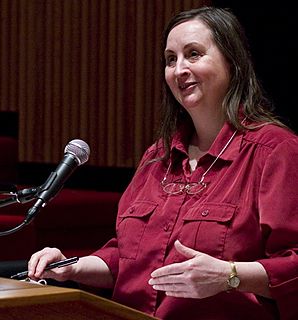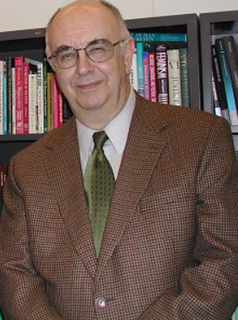
Christine Marion Korsgaard, is an American philosopher who is the Arthur Kingsley Porter Professor of Philosophy at Harvard University. Her main scholarly interests are in moral philosophy and its history; the relation of issues in moral philosophy to issues in metaphysics, the philosophy of mind, and the theory of personal identity; the theory of personal relationships; and in normativity in general.
Daniel A. Dombrowski is an American philosopher and Professor of Philosophy at Seattle University. He was the President of the Metaphysical Society of America (2018–19).

Stephen Richard Lyster Clark is an English philosopher and professor emeritus of philosophy at the University of Liverpool. Clark specialises in the philosophy of religion and animal rights, writing from a philosophical position that might broadly be described as Christian Platonist. He is the author of twenty books, including The Moral Status of Animals (1977), The Nature of the Beast (1982), Animals and Their Moral Standing (1997), G.K. Chesterton (2006), Philosophical Futures (2011), and Ancient Mediterranean Philosophy (2012), as well as 77 scholarly articles, and chapters in another 109 books. He is a former editor-in-chief of the Journal of Applied Philosophy (1990–2001).

Conversations regarding the ethics of eating meat are focused on whether or not it is moral to eat non-human animals. Ultimately, this is a debate that has been ongoing for millennia, and it remains one the most prominent topics in food ethics.

James Webster Rachels was an American philosopher who specialized in ethics and animal rights.

Animal rights is the philosophy according to which many or all sentient animals have moral worth that is independent of their utility for humans, and that their most basic interests—such as in avoiding suffering—should be afforded the same consideration as similar interests of human beings. Broadly speaking, and particularly in popular discourse, the term "animal rights" is often used synonymously with "animal protection" or "animal liberation". More narrowly, "animal rights" refers to the idea that many animals have fundamental rights to be treated with respect as individuals—rights to life, liberty, and freedom from torture that may not be overridden by considerations of aggregate welfare.
The argument from marginal cases is a philosophical argument within animal rights theory regarding the moral status of non-human animals. Its proponents hold that if human infants, the senile, the comatose, and the cognitively disabled have direct moral status, non-human animals must have a similar status, since there is no known morally relevant characteristic that those marginal-case humans have that animals lack. "Moral status" may refer to a right not to be killed or made to suffer, or to a general moral requirement to be treated in a certain way.

Mylan Engel Jr. is a full professor of philosophy at Northern Illinois University in DeKalb.
Stephen David Ross is an American philosopher, currently Distinguished Research Professor of Philosophy, Interpretation, and Culture and of Comparative Literature at Binghamton University. He has published over 30 books in interdisciplinary philosophy, especially on art, literature, ethics, and metaphysics, from American pragmatism through poststructuralism, from human beings to animals and things.
Mary Anne Warren was an American writer and philosophy professor, noted for her writings on the issue of abortion and animal rights.
Contemporary debates about animal welfare and animal rights can be traced back to the ancient world. Records from as early as the 6th century before the common era (BCE) include discussions of animal ethics in Jain and Greek texts. The relations between humans and nonnhumans are also discussed in the books of Exodus and Genesis, Judeo-Christian writings from the 6th or 5th century BCE.

Alice Crary is an American philosopher who currently holds the positions of University Distinguished Professor at the Graduate Faculty, The New School for Social Research in New York City and Visiting Fellow at Regent's Park College, University of Oxford, U.K.. Crary was named one of the three "most inspirational" professors at The New School, above all for "path-breaking work...as Chair to bring about greater inclusiveness among populations traditionally under-represented in philosophy."
Raymond G. Frey was a professor of philosophy at Bowling Green State University, specializing in moral, political and legal philosophy, and author or editor of a number of books, including Interests and Rights: The Case Against Animals (1980), Euthanasia and Physician-Assisted Suicide, and The Oxford Handbook of Animal Ethics.
William O. Stephens, is an American philosopher and scholar of Stoicism. He is Professor Emeritus of Philosophy at Creighton University after retiring from teaching at their Omaha Campus in 2020.
Steven P. Scalet is associate professor for the Division of Legal, Ethical and Historical Studies at the Yale Gordon College of Arts and Sciences, University of Baltimore.
Michael Allen Fox is an American/Canadian/Australian philosopher who was based at Queen's University in Kingston, Ontario from 1966 until his retirement in 2005. He is the author of a number of books, including The Case for Animal Experimentation: An Evolutionary and Ethical Perspective —the arguments and conclusion of which he later rejected—Deep Vegetarianism, The Accessible Hegel, The Remarkable Existentialists, Understanding Peace and Home: A Very Short Introduction.

Oscar Horta is a Spanish animal activist and moral philosopher who is currently a professor in the Department of Philosophy and Anthropology at the University of Santiago de Compostela (USC) and one of the co-founders of the organization Animal Ethics. He is known for his work in animal ethics, especially around the problem of wild animal suffering. He has also worked on the concept of speciesism and on the clarification of the arguments for the moral consideration of nonhuman animals.

Charles Russell Magel was an American philosopher, animal rights activist and bibliographer. He was professor emeritus of Philosophy and Ethics at Moorhead State University.

The relationship between animal ethics and environmental ethics concerns the differing ethical consideration of individual nonhuman animals—particularly those living in spaces outside of direct human control—and conceptual entities such as species, populations and ecosystems. The intersection of these two fields is a prominent component of vegan discourse.
John Lawrence Hill is an American philosopher and law professor.










